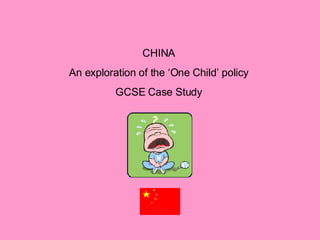
China One Child Policy
- 1. CHINA An exploration of the ‘One Child’ policy GCSE Case Study
- 2. CONTEXT The People’s Republic of China was formed in 1949. At the time, its population was 550 million. People were encouraged to have children as they believed this gave them power, and the population more than doubled to 1.13 billion by 1990. The problem then was how to feed all these people !
- 3. China has a quarter of the world’s population, but only: 7% of the earth’s land surface 8% of the bio-climatic resources 5% of fossil fuels A large part of China is unusable due to mountains, deserts and forests. There was a POPULATION-RESOURCE imbalance.
- 4. The PRO-NATALIST approach continued until the 1970’s. It was calculated that the OPTIMUM population for China was 700 million. The demographer Liu Zeng suggested this would take 100 years to be achieved. Even with only 2 children per couple, this would still involve many millions of extra births, because of the huge POPULATION BASE, which would lead to 1.4 billion by 2080. There will be problems feeding this number of people. This was a good example of the importance of education. Poorly educated women tended to have an average of 6 children in the 1970’s, educated women had an average of 2.1
- 5. An effort to slow down the rate of births was started in the 1970’s. The Government used the slogan: WAN XI SHAO: meaning ‘Later, Longer, Fewer’ This meant: later marriages, longer gaps between children and fewer children. People were encouraged to limit themselves to 2 children. By the end of the 70’s, use of contraception had increased and the fertility rate had halved. People had to wait until they were 25 (for men) or 23 (for women) before they could marry, for which they had to apply for permission. Because the country had a Communist leadership this meant that the rights of individuals were sometimes overlooked.
- 7. At first the policy looked to be succeeding, but opposition grew, especially in rural areas. It was important to ensure that families had sons: these are more respected in the countryside, and continue the family name. Daughters go to live with their husband’s family, so only sons can look after their parents. Sons can also work better in the fields, and are stronger. (Please note this is not my personal opinion….) The birth of a son is an occasion for celebration, with cakes and fireworks. Baby girls are colloquially called ‘maggots in the rice”.
